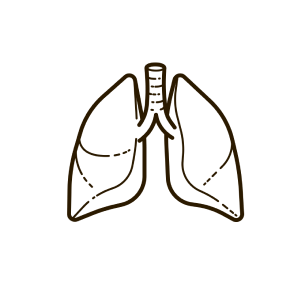Proton therapy to treat thoracic cancer
There is substantial evidence as to the efficacy of proton therapy in radiation treatment for thoracic cancer. With the latest delivery technique, pencil beam scanning, equipped with motion mitigation and plan optimization, the maximum energy of protons is deposited in the tumor, for better conformality and greater sparing of surrounding structures than photon radiation1,2,3. This spares surrounding organs at risk such as the heart, esophagus, spinal cord, lung and brachial plexus from radiation dose so as to reduce risks of radiation-induced toxicities such as esophagitis, pneumonitis and cardiopulmonary impairment4,5.
In addition to decreasing toxicity, proton therapy can improve local control and survival by allowing the delivery of a higher dose6,7.

Download access
Please fill in the form to download the document.
References
- Chang JY, Zhang X, Knopf A, Li H, Mori S, Dong L, Lu HM, Liu W, Badiyan SN, Both S, Meijers A, Lin L, Flampouri S, Li Z, Umegaki K, Simone CB 2nd, Zhu XR. Consensus Guidelines for Implementing Pencil-Beam Scanning Proton Therapy for Thoracic Malignancies on Behalf of the PTCOG Thoracic and Lymphoma Subcommittee. Int J Radiat Oncol Biol Phys. 2017 Sep 1;99(1):41-50. doi: 10.1016/j.ijrobp.2017.05.014. Epub 2017 May 19. PMID: 28816159.
- Register SP, Zhang X, Mohan R, et al. Proton stereotactic body radiation therapy for clinically challenging cases of centrally and superiorly located stage i non-small-cell lung cancer. Int J Radiat Oncol Biol Phys 2011;80:1015-1022.
- Zhang X, Li Y, Pan X, et al. Intensity-modulated proton therapy reduces the dose to normal tissue compared with intensity-modulated radiation therapy or passive scattering proton therapy and enables individualized radical radiotherapy for extensive stage IIIb nonsmall-cell lung cancer: A virtual clinical study. Int J Radiat Oncol Biol Phys 2010;77:357-366.
- Simone CB, Rengan R. The use of proton therapy in the treatment of lung cancers. The Cancer Journal. 2014 Nov 1;20(6):427-32.
- Lazarev S, Rosenzweig K, Samstein R, Salgado LR, Hasan S, Press RH, Sharma S, Powell CA, Hirsch FR, Simone II CB. Where are we with proton beam therapy for thoracic malignancies? Current status and future perspectives. Lung Cancer. 2021 Feb 1;152:157-64.
- Bush DA, Cheek G, Zaheer S, Wallen J, Mirshahidi H, Katerelos A, Grove R, Slater JD. High-dose hypofractionated proton beam radiation therapy is safe and effective for central and peripheral early-stage non-small cell lung cancer: results of a 12-year experience at Loma Linda University Medical Center. International Journal of Radiation Oncology* Biology* Physics. 2013 Aug 1;86(5):964-8.
- Chang JY, Verma V, Li M, Zhang W, Komaki R, Lu C, et al. Proton beam radiotherapy and concurrent chemotherapy for unresectable stage III non-small cell lung cancer: final results of a phase 2 study. JAMA Oncol 2017; 3: e172032.
Frequently asked questions
In this website, we provide you with extensive literature and documents about PT research and indications. In particular, we've compiled a series of in-depth white papers exploring the various types of cancers for which proton therapy could be a viable first-choice option.
Proton therapy is indicated in an increasing number of types of tumors. To know more about proton therapy therapy's efficiency and indications, consult our pages on how to start a treatment and the different types of cancers in which oncologist choose proton therapy as a first-choice treatment.
Proton Therapy is indicated in an increasing number of types of tumors. As it minimizes...
